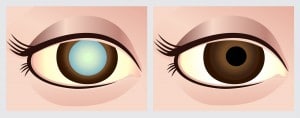 Gaylord, Mich. – Although 20.5 million Americans age 40 and older have cataracts, cataracts are one of the most curable causes of vision loss.
Gaylord, Mich. – Although 20.5 million Americans age 40 and older have cataracts, cataracts are one of the most curable causes of vision loss.
To celebrate Cataract Awareness Month throughout August, Eye M.D.s want to explain the truth about cataracts and remind people they don’t have to live with vision loss from cataracts.
A cataract is the clouding of the eye’s normally clear lens, blocking the passage of light needed for vision. They form slowly and cause no pain. Some stay small and hardly affect vision, but if the cataract does grow and begin to affect your vision, it can usually be removed with surgery.
“Cataracts are one of the leading causes of blindness around the world; however, in most cases, vision loss from cataracts is reversible,” said Dr. Jeff Chaulk an Eye M.D. in Gaylord, Mich. “New techniques developed over the past decade have made cataract surgery one of the most successful procedures available in terms of restoring quality of life to patients.” Each year there are more than one million surgeries performed in the United States.
“There are no drugs or exercises that will make a cataract disappear, and contrary to popular myth, cataracts are not removed using lasers. Lasers are used in follow-up procedures, if needed. Cataract surgery is most often done as an outpatient procedure under local anesthesia,” says Dr. Chaulk. “The cloudy natural lens can be replaced with an artificial lens to give the eye proper focusing power. In most cases, the improvement in the patient’s vision is profound.”
So how do you know if you have a cataract? According to Dr. Chaulk, “Some people notice a gradual painless blurring of vision, double vision in one eye or fading or yellowing of colors. When my older patients mention sensitivity to glare and/or bright light or trouble driving at night, I suspect a cataract. Or, if a patient needs frequent changes to his or her glasses or contact lens prescriptions, I’ll evaluate him or her for a cataract.”
Dr. Chaulk wants to dispel the notion that a cataract has to be “ripe” before it’s removed. “That’s just not true. The best time to have a cataract removed is when it starts to interfere with the things you like to do.”
“Cataract surgery is a great procedure, but it’s still surgery. If cataracts don’t affect your quality of life, you may feel that surgery is not needed. The only person who can really decide when it’s time to have it removed is you.”
